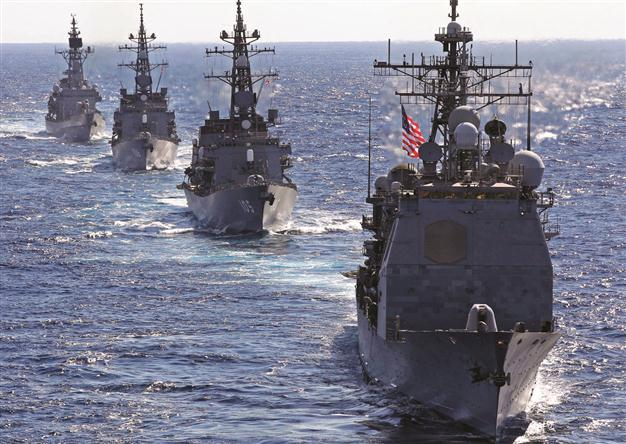US flexes muscles at Beijing
CANBERRA / BEIJING

USS Cowpens (R) leads Japanese Maritime Self Defense Force vessels during ‘Keen Sword,’ a U.S.-Japan joint military exercise over the Pacific Ocean, in this file photo.
U.S. President Barack Obama said yesterday that the U.S. military would expand its role in the Asia-Pacific region despite budget cuts, declaring America was “here to stay” as a Pacific power which would help shape the region’s future.“The United States is a Pacific power, and we are here to stay,” Obama declared in the Australian parliament on the latest stop of a tour that he said augured a “larger and long-term role” in shaping Asia.
His commitment came a day after the United States said it would deploy up to 2,500 Marines to northern Australia and tighten air force cooperation, sparking concern from China, whose rapid rise is reorienting Asia’s strategic balance.
China, which has longstanding fears that its growing power could be hobbled by U.S. influence, voiced misgivings about Obama’s announcement of a de facto military base in Australia. The United States should consider other regional powers when developing ties in Asia, China said yesterday. “When developing state-to-state relations, one should take into account the interests of other countries as well as the whole region, and peace and stability of the region,” ministry spokesman Liu Weimin told reporters. China’s official comments have been relatively mild, but the country’s state media has gone further, accusing Obama of trying to win votes by using his diplomatic ambitions in Asia to detract from his country’s economic woes. The official Xinhua news agency said in a commentary Nov. 16 the U.S. had “yet to reassure the region its Asia-Pacific policy would effectively serve regional stability and prosperity.”
‘Asia Pacific a top priority’
Obama acknowledged China’s unease at what it sees as attempts by Washington to encircle it, pledging to seek greater cooperation with Beijing. “The United States will continue our effort to build a cooperative relationship with China,” Obama said in the signature speech of a tour that has laid bare divisions between Washington and Beijing. “All of our nations have a profound interest in the rise of a peaceful and prosperous China -- and that is why the United States welcomes it,” he added.
The U.S. military, turning its focus away from Iraq and Afghanistan, would be more broadly distributed in Asia, particularly Southeast Asia, more flexible and help build regional capacity, Obama told the Australian parliament. “As we end today’s wars, I have directed my national security team to make our presence and missions in the Asia Pacific a top priority,” Obama said in a major speech on Washington’s vision for the Asia-Pacific region.
“As a result, reductions in U.S. defense spending will not -I repeat, will not - come at the expense of the Asia Pacific.” He added: “We’ll seek more opportunities for cooperation with Beijing, including greater communication between our militaries to promote understanding and avoid miscalculation.”
The new de facto U.S. base in Australia expands the direct U.S. military presence in Asia beyond South Korea and Japan and into Southeast Asia, an area where China has growing economic and strategic interests. It will also put more U.S. troops, ships and aircraft much closer to the South China Sea, over which Beijing has sovereignty disputes with several countries. Obama will raise the issue of the South China Sea during the security East Asia Summit on the Indonesian island of Bali later this week.
Compiled from AFP and Reuters stories by the Daily News staff.
















